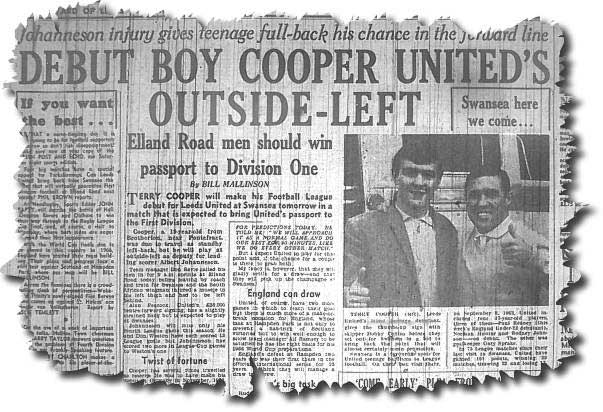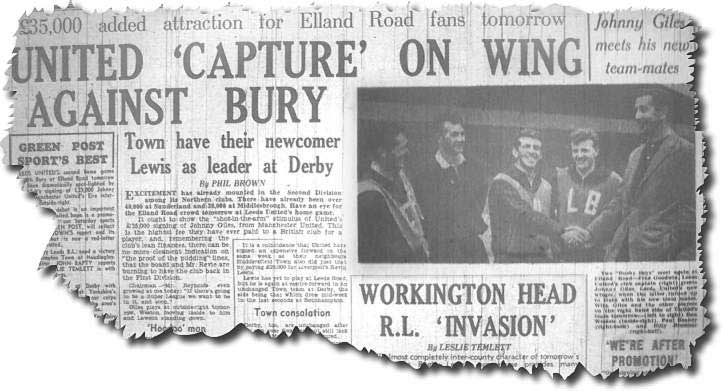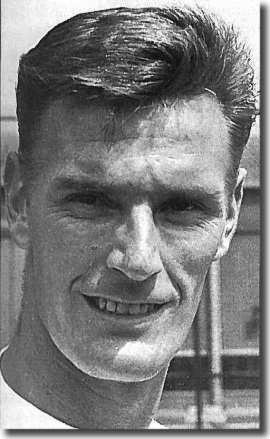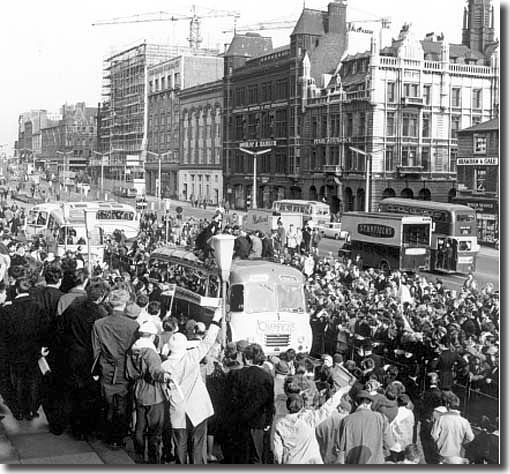 |
 |
 |
 |
 |
 |
 |
 |
 |
Second Division - Vetch Field - 14,321
Scorers: Peacock 2 (15 min, 19), Giles (34)
Swansea Town: Dwyer, R Evans, Hughes, Johnson, Purcell, Williams, Jones, Draper, Thomas, McLaughlin, B Evans
Leeds United: Sprake, Reaney, Bell, Bremner, Charlton, Hunter, Giles, Weston, Peacock, Collins, Cooper
Leeds were top of the table, a point clear of rivals Sunderland, and
winning their final three matches would ensure they won the Division Two
title for the second time in their history. As the Yorkshire Post's
Eric Stanger observed, however, 'the Second Division championship … is
merely the gilt on the gingerbread' and for the moment manager
Don Revie's thoughts rested solely on the match in hand. It was a deeply symbolic occasion for Revie, the supreme fatalist, with
promotion up for grabs at Vetch Field: two years earlier, Bobby
Collins, a £25,000 buy from Everton, had made his debut at the same
ground before inspiring United's escape
from an unprecedented drop into Division Three; Swansea was also the
venue when the manager had gambled on youth in
September 1962, giving debuts to teenagers Paul Reaney, Norman Hunter
and Rod Johnson. Both of those
Swansea contests brought memorable victories. With almost a superstitious nod in honour of those fateful occasions,
Revie now blooded 19-year-old Terry Cooper on the wing in place of Albert
Johanneson. Cooper had started his career as an outside-left before
being converted by Revie into a full-back and promised to make United
a little more solid down the flank, hinting that the manager would be
happy to settle for a point. Originally, Pontefract-born Cooper had been due to travel as a standby
left-back, but Johanneson injured a thigh muscle during training and was
left behind when the coach left Yorkshire. Cooper was the only change in the line up that had seen Leyton Orient
off at home the previous weekend. That meant the first choice defence
of Gary Sprake, Paul Reaney, Jack Charlton,
Norman Hunter and Willie Bell was on
duty again - Charlton had only recently returned from a lengthy spell
out through injury but had restored much of the defence's early-season
impenetrability. Arrayed in front of the back four were Johnny Giles, Billy Bremner and
Bobby Collins, possibly the best midfield combination in the country and
definitely the shortest, while Cooper took his place in the front line
alongside Don Weston and Alan
Peacock. Giles and Peacock had arrived during the season in big money moves from
Manchester United and Middlesbrough respectively and were proven international
players. They had brought polish to a team that had previously resembled
a collection of rather rough diamonds. They had also enjoyed a tremendous run in the FA Cup, beating First Division
Sheffield United and Stoke City on the way to a shock 2-1 win at Liverpool's
Anfield fortress in the quarter-final - the Reds were about to become
league champions. Swansea finally went out in a semi-final showdown with
Preston North End, who beat them 2-1 at Villa Park. However, Leeds United were now a battle-hardened team, having led the
Second Division title race for most of the season, and they slipped quickly
and smoothly into top gear on a fine spring day with little wind and the
pitch in excellent condition. Eric Stanger: 'They almost instantly began
to show a superiority over the home side, cutting their defence open with
swift attacking play out to the wings and back and very promptly crushing
any countermoves.' United had no intention of leaving anything to chance on such a momentous
day and overpowered the home side, racing into a three goal lead in little
over half an hour. It was Terry Cooper who set the wheels in motion, supplying
the cross after 15 minutes that centre-forward Alan Peacock slammed home
to open the scoring. Within four minutes, Peacock had repeated the dose,
scoring his and United's second after a corner by Bobby Collins was flicked
on by Johnny Giles. There was no holding Leeds in this period, although it was another 15
minutes before they added to their lead. Cooper's corner from the left
reached Giles on the right edge of the area, about 12 yards out. He caught
the ball perfectly and, although his shot was partially blocked by defender
Roy Evans, there was enough pace on the effort for it to find the net.
The game was as good as over, with the Swans having no answer to Leeds'
slick football. Phil Brown: 'United looked almost home and dry and yet
only 34 minutes had gone. What Elland Road would say to three goals in
little over half an hour Even a top notch side would have struggled to pull such a lead back against
a team renowned for its defensive excellence, but the improvement a 3-0
scoreline brought to United's goal average was too important to risk.
Rather than going all out for more goals, as they could well have been
excused for doing, United remembered the lectures of Don Revie and settled
for a no frills performance from then on, doing only what was necessary
to preserve their emphatic lead. Bobby Collins played supremely in a holding role and, with Giles and
Cooper tucking in well, gaps proved hard to find for Swansea. However,
United's conservative approach allowed the Welsh side to come more into
the game in the second half, when they found new fire. They carved out
some decent chances, but found United keeper Sprake (a native of Swansea)
the equal of everything they could throw at him. Leeds were not wholly negative after the break and did have the chances
to increase their lead, but Town keeper Dwyer had the luck with him on
two occasions when foiling Weston. While Collins was, as so often in this wonderful season, the man of the
match, Terry Cooper enjoyed an impressive debut, prompting Phil Brown
to write in the Yorkshire Evening Post: 'I've seen a few good League
debuts since Mr Revie's nursery began to work, but Cooper's was among
the best. This Pontefract lad had just astonishing composure and moves,
admirable determination and enterprise, good control and judgement. You
would have thought he had been in the team for months. One match can deceive,
but I doubt it in Cooper's case. If ever a poor debut could have been
forgiven it was in this match. But he was clearly United's best forward.' In the end, there were no more goals and Leeds ran out comfortable 3-0
winners, confirming their promotion. With Preston and Sunderland both
involved in scoreless draws the result also strengthened the club's title
bid. Phil Brown said that the win was 'just about the best of their 11 away
successes in the League this season. I say "just about the best"
only because their autumnal 4-1 win at Southampton was a really brilliant
performance against a better side than Swansea. 'United's play, both in their attacking first half and their contrasting
second, was technically almost faultless. The fast, sudden and accurate
striking of the first half, plus finishing of the kind Elland Road would
have erupted had it seen it, had Swansea reeling.' Don Revie paid tribute to his men after the game: 'We have a family spirit
at Elland Road and everyone has been prepared to work that little bit
harder and do that little bit extra. That has been shown on the field.
The players have given 100 percent effort in every game, and no team,
win, lose or draw, can do more than that. Their obedience to orders, tactical
and The Yorkshire Post's Eric Stanger used the occasion to laud the achievement
of Revie in transforming a dying club: 'Leeds United's return to the First Division is all the more remarkable
when one considers that two years ago only a desperate late effort prevented
them from slipping into the Third. Yet that was not the nadir of their
fortunes in recent years. That followed their relegation from the First
Division for the fourth time in their history at the end of season
1959/60. Muttered discontent became open revolt against the board
after a moderate start to the following
season and resulted in the moving of a vote of no confidence in the
directors in the December of that year. 'The motion was easily defeated on a shareholders' vote, but the acrimony
at the time helped not only to clear the air but eventually led to almost
complete reorganisation. The hint was taken, new directors, with wealth
to put into a club faced with liabilities of more than £100,000, were
elected and generally there was a transfusion of both money and energy. 'A most significant step was taken the following March, when Don Revie,
still an active player, was appointed team manager. He had no experience
of management, only a wealth of football knowledge and ideas gathered
from some 15 years as a player and he quickly showed himself a person
of strong character. From the beginning he insisted on full control of
the playing side. All he asked was five years in which to build up a really
good side and that was not unreasonable considering the state of the club's
playing register at the time. 'The gospel he preached in the boardroom and out of it was that no club
could be successful in modern football unless it built from the bottom.
By that he meant signing the best of schoolboy talent as junior professionals,
coaching and teaching them so that as footballers they grew up with the
club. That was long-term but it is a policy which has paid Revie and Leeds
United much earlier dividends than they expected. How many miles Don Revie
has travelled in search of young talent and how many hours he has put
in only he knows. Few managers can have shown such an infinite capacity
for hard work. 'One of the first things he did, and to my mind one of the most important,
was to lay down with his coaches and training staff a club pattern and
style of play. That was something which had been lacking in the 40 years
or so I have known Leeds United. 'The benefit of an overall team plan is that players can step from the
junior side to the reserves and to the first-team knowing exactly what
is required of them. The club's style and general tactics are ingrained
in them. But in United's case, before it could be fully operative, there
had to be a lot of improvisation, and a lot of make and mend in the first
team if relegation to the 'Collins, whose best days were thought to be over at 30, not only led
them to safety that season but his shrewd generalship and leadership have
been decisive factors in taking them back into the First Division. Few
inside-forwards work harder than Collins and generally they are a hard-working
race - they have to be in the modern game. Few players can strike such
a response from their colleagues. His influence both in the dressing room
and on the field has been incalculable. It may be an overstatement to
say that he has made Billy Bremner into one of the best wing-halves in
the country, but not so much so. Bremner, I know, has such respect and
affection for his fellow Scot and his football has improved so much under
his lead that United, who could not get £25,000 for him a couple of seasons
back, would now not take double that fee for him. 'Bremner and Collins have formed the hub round which the team has revolved
- the midfield dynamo, as current football phraseology has it. They are
responsible for the quick transformation from defence to attack, which
is so essential if the modern blanket defence system is not to be completely
stultifying. 'But Leeds United's success this season has not been due to any one or
even two men. It stems really from a happy boardroom, a happy executive
and happy players. Man for man, position for position, other Second Division
clubs could point to a pull over United but none can boast a better team
in the full sense of the word. 'Every man has been prepared to pull every ounce of his weight, to shoulder
extra burdens to help out a colleague in trouble. Individual glory has
been readily sacrificed for the good of the whole, which is true team
spirit and has enabled many a game to be won when victory has seemed unlikely.
United may not always have been an attractive side to watch, in the sense
of providing glittering spectacle, but they have been a mightily efficient
one.' Andrew Mourant recalled the aftermath of the match: 'Revie, almost pathologically
superstitious, did not buy the champagne they were to drink beforehand,
fearing it might tempt some malign fate. Instead, he and several players
made a tour of the Swansea pubs after the match in search of celebratory
bottles. It did not take them too long to become inebriated on the train
journey home.' Bagchi and Rogerson: 'In a jubilant dressing room Harry Reynolds, openly
weeping, uncorked the champagne he'd requisitioned from a nearby pub,
composed a telegram to congratulate Sunderland on their promotion, lionised
his manager - offering him an improved contract, the third in three years
- and promised to buy the fish and chips on the trip home. The tortuous
journey had begun in South Wales; fittingly, it also ended there.' Leeds United had toiled hard and with scant praise outside the confines
of Elland Road all season. They
fully merited the chance to let their hair down, even with games yet to
play, and took it with gusto, ready for all that the giants of the First
Division could throw at them. Stage one of the Revie revolution was complete. The
Leeds United party that took the lengthy trip to the mining district of
South Wales for a Second Division match with Swansea in April 1964 did
so in high spirits. They knew that a point from the game would all but
guarantee their return to Division One after four years out of the top
flight. While a win was needed to make United mathematically certain of
finishing in the top two, the Whites' goal average was so markedly superior
to third-placed Preston North End that to all intents and purposes the
draw would be enough.
The
Leeds United party that took the lengthy trip to the mining district of
South Wales for a Second Division match with Swansea in April 1964 did
so in high spirits. They knew that a point from the game would all but
guarantee their return to Division One after four years out of the top
flight. While a win was needed to make United mathematically certain of
finishing in the top two, the Whites' goal average was so markedly superior
to third-placed Preston North End that to all intents and purposes the
draw would be enough. Don
Revie offered no predictions of the result, saying only, 'We will approach
it as a normal game and do our best for 90 minutes, like we do every other
match.' He was confident of victory, if understandably nervous. Swansea
were 18th in the table, just three points off the relegation places, but
had come close to pulling off a shock before losing 2-1 at Elland Road
in November.
Don
Revie offered no predictions of the result, saying only, 'We will approach
it as a normal game and do our best for 90 minutes, like we do every other
match.' He was confident of victory, if understandably nervous. Swansea
were 18th in the table, just three points off the relegation places, but
had come close to pulling off a shock before losing 2-1 at Elland Road
in November. I can hardly imagine.'
I can hardly imagine.' otherwise, has been most gratifying and I know they have repeatedly lost
the chance to make flattering headlines by making sure of victory or a
point with unspectacular methods.'
otherwise, has been most gratifying and I know they have repeatedly lost
the chance to make flattering headlines by making sure of victory or a
point with unspectacular methods.' Third Division were to be avoided. Of the signings in March 1962, none
turned out to be more important than that of Bobby Collins, a bargain,
so it proved, at £25,000 from Everton.
Third Division were to be avoided. Of the signings in March 1962, none
turned out to be more important than that of Bobby Collins, a bargain,
so it proved, at £25,000 from Everton.